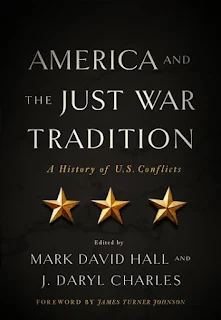 |
| America and the Just war tradition: A History of US Conflicts edited by Mark David Hall |
DESCRIPTION:
The
just war tradition is a centuries-old ethical framework that seeks to determine
when and how the use of force in warfare can be morally justified. It has its
roots in Christian theology but has been adapted and expanded upon by various
philosophers, theologians, and political theorists over time.
Key
principles of the just war tradition typically include:
Jus ad
Bellum (Justice in Going to War):
- Just Cause: The war must have a just and morally acceptable reason, such as self-defense or defense of others.
- Right Authority: The decision to go to war must be made by a legitimate authority, typically a government.
- Last Resort: All peaceful means of resolving the conflict must have been exhausted before resorting to war.
- Proportionality: The harm caused by the war must not outweigh the good achieved by it.
Jus in
Bello (Justice in Conducting War):
- Discrimination: The use of force must discriminate between combatants and non-combatants, and civilian casualties should be minimized.
- Proportionality: The use of force in war should be proportionate to the military objective and should not result in excessive harm.
- Fair Treatment of Prisoners of War: Captured enemy combatants should be treated humanely.
Jus
Post Bellum (Justice After War):
- There should be a just and lasting peace settlement after the war.
- The victorious party should seek to rebuild and reconcile rather than seeking revenge.
Throughout
American history, various U.S. conflicts have been analyzed and debated in the
context of the just war tradition. Some proponents argue that certain wars,
such as World War II, meet the criteria for a just war due to the clear and
grave injustices they sought to address. Others, however, have criticized U.S.
military actions, such as the Vietnam War or the Iraq War, on the grounds that
they did not meet the principles of just war.
